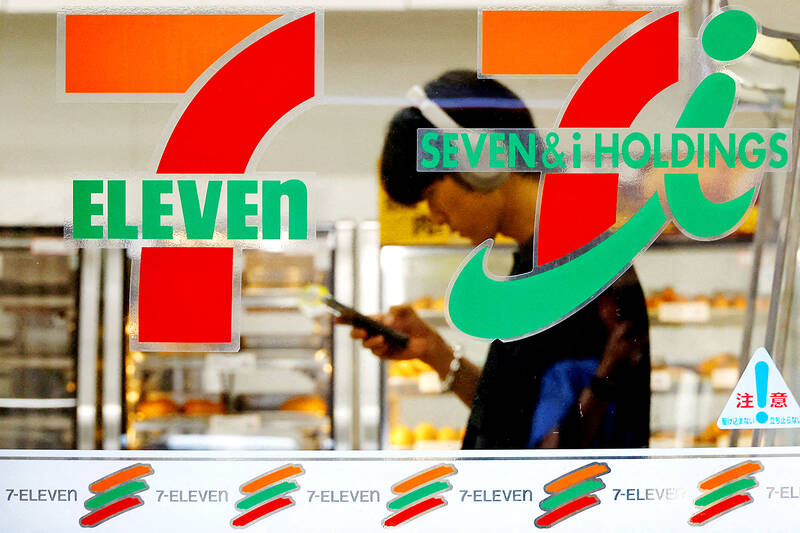Seven & i Holdings Co rejected a US$38.7 billion takeover proposal from Alimentation Couche-Tard Inc as too low and fraught with regulatory risk while signaling a willingness to consider a sweetened offer.
The operator of 7-Eleven shops published a letter outlining its response following a review of the proposal by a committee of independent outside directors.
“We are open to sincerely consider any proposal that is in the best interests of Seven & i shareholders and other stakeholders,” Stephen Dacus, chair of the special committee appointed by Seven & i’s board, wrote in the letter. “However, we will resist any proposal that deprives our shareholders of the company’s intrinsic value or that fails to specifically address very real regulatory concerns.”

Photo: Reuters
Couche-Tard and Seven & i disclosed the Canadian company’s approach on Aug. 19, but had not yet given details of the potential offer, which valued Seven & i at about US$14.86 per share, indicating a market value of ¥5.55 trillion (US$38.7 billion). While that represents a premium of 21 percent since the proposal was disclosed, it is below a recent one-year peak seen in February.
“We do not believe, for several critical reasons, that the proposal you have put forward provides a basis for us to engage in substantive discussions regarding a potential transaction,” Seven & i said in the letter. “Your proposal is opportunistically timed and grossly undervalues our standalone path and the additional actionable avenues we see to realize and unlock shareholder value in the near to medium-term.”
Seven & i told Couche-Tard that its bid does not reflect the value of its business and growth strategy. The Japanese chain also raised concerns about breaching US antitrust laws in the letter.
“While none of this sounds particularly positive, Seven & i is at least opening to door to further negotiations, which at the very least demands a higher bid,” Ortus Advisors Pte strategist Andrew Jackson said.
Alex Miller, Couche-Tard’s chief operating officer and soon-to-be CEO, told analysts on the company’s earnings call Thursday that it wants to engage constructively with Seven & i and that it is confident it can finance the deal.
The proceedings are being closely watched at home and abroad as a test of new government guidelines on mergers and acquisitions instructing companies to seriously consider takeover offers.
A deal between the two companies could create a global convenience store behemoth with more than 100,000 stores. That could invite scrutiny from US competition authorities. Another potential obstruction for the takeover is that the Japanese government can block the deal or ask for changes in the terms.

WEAKER ACTIVITY: The sharpest deterioration was seen in the electronics and optical components sector, with the production index falling 13.2 points to 44.5 Taiwan’s manufacturing sector last month contracted for a second consecutive month, with the purchasing managers’ index (PMI) slipping to 48, reflecting ongoing caution over trade uncertainties, the Chung-Hua Institution for Economic Research (CIER, 中華經濟研究院) said yesterday. The decline reflects growing caution among companies amid uncertainty surrounding US tariffs, semiconductor duties and automotive import levies, and it is also likely linked to fading front-loading activity, CIER president Lien Hsien-ming (連賢明) said. “Some clients have started shifting orders to Southeast Asian countries where tariff regimes are already clear,” Lien told a news conference. Firms across the supply chain are also lowering stock levels to mitigate

Six Taiwanese companies, including contract chipmaker Taiwan Semiconductor Manufacturing Co (TSMC, 台積電), made the 2025 Fortune Global 500 list of the world’s largest firms by revenue. In a report published by New York-based Fortune magazine on Tuesday, Hon Hai Precision Industry Co (鴻海精密), also known as Foxconn Technology Group (富士康科技集團), ranked highest among Taiwanese firms, placing 28th with revenue of US$213.69 billion. Up 60 spots from last year, TSMC rose to No. 126 with US$90.16 billion in revenue, followed by Quanta Computer Inc (廣達) at 348th, Pegatron Corp (和碩) at 461st, CPC Corp, Taiwan (台灣中油) at 494th and Wistron Corp (緯創) at

NEGOTIATIONS: Semiconductors play an outsized role in Taiwan’s industrial and economic development and are a major driver of the Taiwan-US trade imbalance With US President Donald Trump threatening to impose tariffs on semiconductors, Taiwan is expected to face a significant challenge, as information and communications technology (ICT) products account for more than 70 percent of its exports to the US, Chung-Hua Institution for Economic Research (CIER, 中華經濟研究院) president Lien Hsien-ming (連賢明) said on Friday. Compared with other countries, semiconductors play a disproportionately large role in Taiwan’s industrial and economic development, Lien said. As the sixth-largest contributor to the US trade deficit, Taiwan recorded a US$73.9 billion trade surplus with the US last year — up from US$47.8 billion in 2023 — driven by strong

ASE Technology Holding Co (ASE, 日月光投控), the world’s biggest chip assembly and testing service provider, yesterday said it would boost equipment capital expenditure by up to 16 percent for this year to cope with strong customer demand for artificial intelligence (AI) applications. Aside from AI, a growing demand for semiconductors used in the automotive and industrial sectors is to drive ASE’s capacity next year, the Kaohsiung-based company said. “We do see the disparity between AI and other general sectors, and that pretty much aligns the scenario in the first half of this year,” ASE chief operating officer Tien Wu (吳田玉) told an